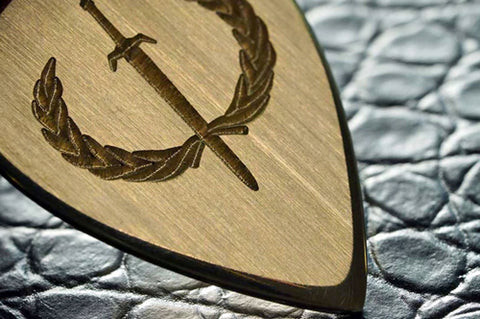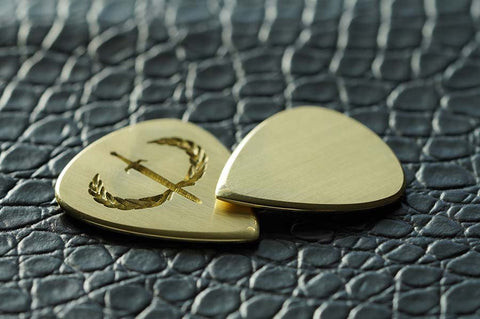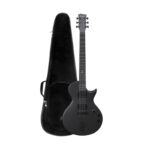Metal Guitar Picks stand out in the vast world of guitar accessories, offering a distinct alternative to traditional materials like plastic, acrylic, or wood. For guitarists seeking to explore new sonic territories and inject a unique edge into their playing, metal plectrums present a compelling option. When we talk about metal picks, we’re referring to picks crafted from a variety of metals, including:
- Aluminum
- Brass
- Copper
- Steel
- Titanium
Each of these materials brings its own subtle nuances to the tone and feel, but metal picks, in general, share a set of characteristics that can be both advantageous and disadvantageous depending on your playing style and musical preferences.
In this comprehensive guide, we’ll delve into the world of metal guitar picks, exploring the pros and cons, and helping you determine if they are the right choice to elevate your guitar playing.
 Close-up of brass metal guitar picks alongside acoustic and plastic picks, showcasing material and variety.
Close-up of brass metal guitar picks alongside acoustic and plastic picks, showcasing material and variety.
The Advantages of Playing with Metal Guitar Picks
Metal guitar picks offer several unique benefits that can significantly enhance your guitar playing experience, particularly for certain musical styles and techniques.
Enhanced Articulation and Clarity
One of the most celebrated advantages of metal guitar picks is their ability to produce exceptionally articulate and clear notes. The rigid nature of metal allows for a more direct and precise attack on the strings, resulting in each note ringing out with enhanced definition. This clarity is especially beneficial for lead guitar playing, where individual notes need to stand out and sustain. Metal picks help each note to “sing” with a bell-like quality, making them ideal for solos and melodic passages.
Unmatched Durability and Longevity
Compared to plastic or even thicker materials like wood or acrylic, metal guitar picks are incredibly durable. They resist wear and tear far more effectively, maintaining their shape and edge for extended periods. This longevity means you won’t need to replace metal picks as frequently, making them a cost-effective choice in the long run, especially for players who practice and perform regularly. The robust nature of metal also means they are less likely to chip or break, even under aggressive playing styles.
Unique Tonal Qualities: Brightness and Projection
Metal guitar picks are known for producing a brighter and more resonant tone compared to picks made from softer materials. The hardness of the metal reflects more of the string’s vibrations, resulting in a sound that is often described as punchy, crisp, and articulate. This brighter tonal quality can be particularly advantageous in genres like metal, rock, and blues, where a strong and projecting sound is desired. Metal picks can help your guitar cut through the mix, ensuring your riffs and solos are heard clearly.
Grip Options and Textures
While some might assume metal picks are inherently slippery, many manufacturers offer metal picks with textured surfaces, grip holes, or rubber grips to enhance handling. These grip enhancements address the potential slipperiness and ensure a secure hold, even during fast and dynamic playing. The added weight of metal picks can also contribute to a feeling of control and stability for some players.
The Drawbacks of Playing with Metal Guitar Picks
Despite their advantages, metal guitar picks also come with certain drawbacks that guitarists should consider.
Potential Slipperyness: Grip Can Be an Issue
As noted earlier, while grip enhancements are available, some basic metal guitar picks, especially those with a smooth, untextured surface, can be slippery. This can be problematic, particularly for players with sweaty hands or those who tend to drop their picks frequently. If you opt for metal picks without grip features, you might need to consider adding aftermarket grip solutions like rubber pads or cork grips to ensure secure handling.
Increased Volume: They Are Louder
The very characteristic that contributes to the bright tone of metal picks – their reflective nature – also makes them louder than picks made from other materials. The metallic contact with the strings amplifies the vibrations, resulting in a louder attack and overall sound. This increased volume can be a disadvantage in quieter practice settings or when trying to avoid disturbing others. The “click” of metal on metal can also be more pronounced and potentially undesirable in certain recording situations or acoustic performances.
Playability Challenges: Stiffness and Weight
Metal guitar picks can feel significantly different to play with compared to lighter, more flexible plastic picks. Some metal picks are simply stamped out of metal sheets without beveling, resulting in sharp, unrefined edges that can feel harsh against the strings and hinder smooth playing. This lack of beveling can create a grating sensation and make techniques like fast strumming or sweep picking more challenging. Additionally, the heavier weight of metal picks can take some getting used to, especially for players accustomed to lighter picks. Extended playing sessions with heavier metal picks might initially cause fatigue in the picking hand.
Wear and Tear: On Strings and Your Guitar
The hardness of metal, while contributing to durability for the pick itself, can lead to increased wear and tear on guitar strings. The abrasive nature of metal against metal can accelerate string wear, potentially requiring more frequent string changes, especially for players who play aggressively or for long durations. Furthermore, metal picks can scratch the guitar’s finish more easily than softer picks. Careless picking technique or accidental scrapes with a metal pick can leave noticeable marks, particularly on guitars with delicate finishes. Metal picks are less forgiving and require a more controlled and precise picking technique to minimize potential damage to the instrument. Therefore, they might not be the most suitable choice for beginner guitarists who are still developing their picking control.
Are Metal Guitar Picks Good for Heavy Metal Music?
Despite some of the drawbacks, metal guitar picks are indeed a popular choice among metal guitarists, and for good reason. Their ability to produce a bright, articulate, and projecting tone aligns perfectly with the sonic aesthetics of heavy metal and related genres.
For lead guitar playing in metal, metal picks truly shine. The enhanced clarity and sustain they offer are invaluable for making fast runs, intricate solos, and soaring melodies cut through the heavy distortion and dense instrumentation characteristic of metal music. Each note rings out with definition and power, ensuring every nuance of your lead lines is heard.
For rhythm guitar playing, metal picks can also be effective, particularly for genres that require aggressive and percussive chugging or tight, articulate riffing. However, the weight and stiffness of metal picks might present a challenge for players who require extreme speed and precision in their rhythm playing, especially in genres like thrash or speed metal. The heavier feel can sometimes hinder very fast alternate picking patterns. Ultimately, whether metal picks are ideal for rhythm playing often comes down to personal preference and playing style.
Choosing the Right Metal Guitar Pick
If you’re intrigued by metal guitar picks and want to try them out, consider these factors when making your selection:
- Material: Experiment with different metals like brass, steel, aluminum, copper, and titanium to discover the tonal nuances and feel that you prefer. Brass tends to be warmer, steel brighter, and aluminum lighter, for example.
- Thickness: Metal picks are available in various thicknesses. Thicker picks generally offer more stiffness and a bolder tone, while thinner picks provide more flexibility and a slightly brighter attack.
- Bevel: Look for metal picks with beveled edges for smoother playing and reduced string friction. Beveling makes techniques like strumming and alternate picking more comfortable.
- Grip: Choose metal picks with textured surfaces, grip holes, or added grips if you are concerned about slipperiness. A secure grip is crucial for confident and controlled playing.
Iron Age “Ducat” Metal Guitar Picks
If you’re ready to experience the unique qualities of metal guitar picks, consider the “Ducat” Classics from Iron Age. These picks are crafted from high-quality solid brass and embody all the benefits discussed. The “Ducat” picks deliver a bright, articulate tone, exceptional durability, and a comfortable playing experience.
Tap the image below to explore the “Ducat” picks and see how they can transform your sound! You’ll also find numerous customer reviews and photos to help you make an informed decision.
 Selection of Iron Age brass metal guitar picks displayed with guitar strings, highlighting shapes and design.
Selection of Iron Age brass metal guitar picks displayed with guitar strings, highlighting shapes and design.
The brass “Ducat” picks are a limited edition item and availability may vary. However, if you have the opportunity to try them, use the promo code: MGP-15 to receive a 15% discount.
This exclusive offer is available only through this blog post.
Looking for a way to keep your new metal picks handy? Explore our guide to Pick Holders.
Conclusion
Pros:
- Articulation & Control: Excellent for lead guitar, enhancing note clarity and sustain.
- Durability: Highly durable and long-lasting compared to other materials.
- Grip: Many options offer enhanced grip features for secure handling.
- Tone: Produce a bright, punchy, and projecting tone.
Cons:
- Grip: Plain metal picks can be slippery.
- Volume: Louder than other picks, potentially disturbing in quiet settings.
- Playability: Unbeveled picks can feel harsh; heavier weight may require adjustment.
- Wear & Tear: Can increase string wear and risk of guitar scratches.
Metal guitar picks are a valuable addition to any guitarist’s toolkit, offering unique tonal and performance characteristics. However, they are not universally ideal.
Are metal picks good guitar picks for beginners? Probably not as a first pick. Beginners might benefit from starting with more forgiving and less potentially damaging picks as they develop their technique.
Ultimately, the decision of whether or not to use metal guitar picks depends on your individual playing style, musical preferences, and the specific sound you aim to achieve. We encourage you to experiment and weigh the pros and cons to discover if metal picks are the right choice for you.
We hope this guide has been informative and helpful! Thank you for reading.
Have you experimented with metal guitar picks? Share your experiences and thoughts in the comments below! We’d love to hear your perspective.
-The Iron Age Team
Alex Rodea
Author
Founder of Iron Age, my guitar journey began in 2006, fueling a passion for crafting premium guitar accessories that embody timeless style & innovative expression. Through my Stay Tuned Guitar site I also share tips & info for new guitarists, offering everything from beginner tutorials to DIY tips & general music knowledge.

